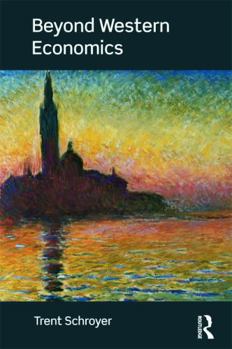Beyond Western Economics: Remembering Other Economic Cultures
This book combines intellectual history with contemporary events to offer a critique of mainstream economic thought and its neoliberal policy incarnation in global capitalism. The critique operates both theoretically, at the level of metaphysics and the philosophy of science, and concretely, in case studies of globalization and world events.
Trent Schroyer provides a moral and cultural interpretation of modernity and scientism, highlighting their political and economic consequences - but the book's main purpose is not to criticize. The author moves beyond this to offer alternative "economic cultures," again combining abstract theoretical analysis with concrete case studies of alternative economic formations from local self-sufficiency movements to cooperatives and other anti-capitalist institutional experiments.
These case studies exhibit an impressive range of variation, from first world to third world, from reformist to utopian transformative. Finally, Schroyer links the project to the global justice movement that opposes corporate globalization and eventually links participatory economics and democratic politics to a new image of science as "participatory social learning."





